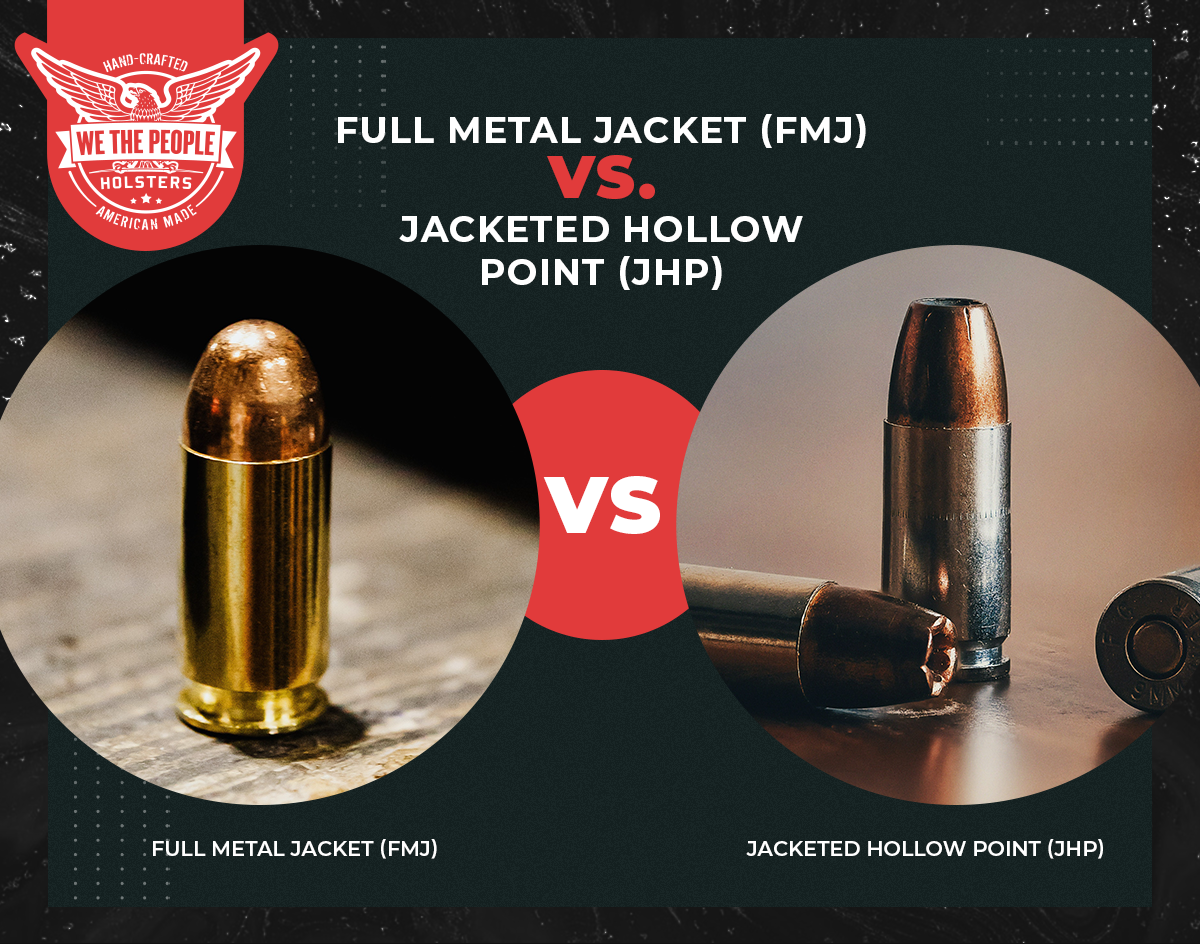Both full metal jacket and jacketed hollow point ammunition serve their own distinct purpose, and both ammo types have their advantages and disadvantages. Whether you’re a new gun owner or whether you’re looking to expand your ammo knowledge, it’s essential to know the primary differences between these two ammo types.
Full Metal Jacket Ammo

Full metal jacket rounds were initially developed in 1882 for the Swiss military. They were a significant technological improvement over the existing lead-based bullets.
Full Metal Jacket (FMJ) ammunition consists of a soft lead core encased in an outer jacket (or shell) of a harder metal. FMJ is the most common type of ammo that you can purchase today. It’s also usually the most affordable.
FMJ Pros & Cons:
PRO: Outer Metal Jacket
One thing that makes full metal jacket rounds so attractive is that the outer metal jacket of an FMJ round reduces the amount of metal deposit in a firearm’s bore or barrel. As a result, FMJ ammo can attain higher muzzle velocities than many other kinds of ammunition.
PRO: Low Cost
FMJ rounds are significantly less expensive than JHP rounds. In some ammo brands, full metal jackets are half the price of hollow points. For this reason, FMJ rounds are commonly cited as a good choice for target practice or stockpiling purposes.
CON: Collateral Damage
FMJ rounds are often referred to as ‘ball ammunition.’ There are differing opinions about where the term ball ammo came from. Still, all will agree that the rounded tip of the FMJ has serious penetration power, especially compared to hollow points. While this may seem like a pro for self-defense purposes, the pass-through penetration power can cause unintended collateral damage.
FMJ rounds are not designed to expand when they hit a target. As a result, they will create smaller-sized wounds and stand a good chance of passing through the target. If there objects, walls, bystanders, etc., on the other side of the target, or FMJs can be fatal to the unintended target.
Jacket Hollow Points

Jacket hollow point (JHP) bullets, also referred to as “dum-dums” - named after the British arsenal, date back to the late 19th century. Unlike the full rounded tip of an FMJ, JHP rounds have an exposed, hollowed-out cavity. Hollow point rounds were created as an alternative to solid lead bullets since solid lead bullets were prone to deforming when hitting a target at high velocities.
JHP Pros & Cons:
PRO: Less Collateral damage
Jacketed hollow-point bullets were designed to expand when hitting a target, which reduces the penetration depth. The reduced penetration decreases the odds that the bullet will pass through the target and cause potential collateral damage to an unintended object or person.
Today, jacket hollow point ammunition is favored by most American law enforcement agencies. Many American concealed carry holders also prefer it because it incapacitates targets faster while reducing collateral damage.
However, one important thing to note is that the bullet’s penetration hole size is significantly increased. This expansion can cause much more damage to the target. The process of a jacketed hollow point bullet expanding is referred to as mushrooming because the expanded round will vaguely resemble a mushroom after impact.
PRO: Shooting Accuracy
JHP rounds are more accurate than FMJ rounds because ammo manufacturers can maintain better tip shape consistency. The rounded tip shape of full metal jackets can become easily warped or dinged, reducing accuracy. The aerodynamic properties of hollow point bullets’ aerodynamic properties are superior. They can typically produce tighter groupings (also assuming that you’re using a quality and accurate firearm).
The United States military also relies on hollow-point loads for their sniper and DMR rifles due to their superior accuracy.
CON: Cost
The biggest disadvantage to JHP rounds is that they are almost always much more expensive than FMJ rounds. Jacketed hollow points are best suited for guns intended for home defense and concealment.
Final Thoughts

Both FMJ and JHP rounds serve their respective purposes very well. In a nutshell, full metal jackets are typically for target practice, and jacketed hollow points generally are for defense. While it is true that hollow points aren’t usually used as practicing bullets, that doesn’t mean you shouldn’t practice with them occasionally. After all, you need to know that your handgun can reliably feed the specific defensive ammunition you’re going to be running through it. A good rule of thumb is to run at least one box of your self-defense ammo of choice through your pistol to confirm reliable function.
Finally, carefully research the firearm you are using for self-defense. While almost all modern-day pistols can easily feed both FMJ and JHP rounds, certain older designs may have a more challenging time reliably feeding JHP ammo.
We the People Holsters believe in the proposition that every person has a natural right to self-defense. One of the best self-defense tools is a quality gun, holster, and gun belt setup. We carry a full lineup of other holster accessories, apparel, gift items, and merchandise any gun owner would love to have. Don't forget to shop our website today for all your handgun accessory needs!


